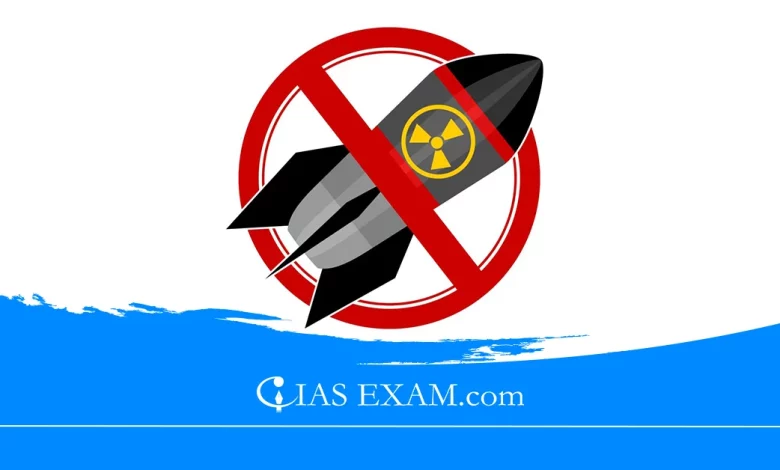
Context
The Secretary-General of the United Nations has recently urged States with nuclear arsenals for disarmament.
About
- Disarmament refers to the act of removing or abolishing weapons (especially offensive arms) either unilaterally or reciprocally.
- It may refer either to reducing the number of arms, or to eliminating entire categories of weapons.
Nuclear Powers in the World
- There are 9 countries recognized as owning nuclear weapons.
- These countries are frequently called “nuclear-armed states” or “nuclear powers.”
- United States, Russia, China, United Kingdom, France, India, Pakistan, North Korea and Israel.
Treaties Related to Nuclear Disarmament
- Treaty on the Non-Proliferation of Nuclear Weapons (NPT): Signed in 1968 and entered into force in 1970, the NPT aims to stop the spread of nuclear weapons and promote disarmament.
- It divides the world into nuclear-weapon states (NWS), identified as possessing nuclear weapons at the time of the treaty’s signing, and non-nuclear-weapon states (NNWS), which agree no longer to broaden or acquire nuclear weapons.
- The treaty also requires NWS to pursue disarmament negotiations in good faith.
- Treaty on the Prohibition of Nuclear Weapons (TPNW): Adopted by means of the United Nations in 2017 and opened for signature in 2018, the TPNW aims to restrict the improvement, trying out, manufacturing, stockpiling, stationing, transfer, use, and chance of use of nuclear weapons.
- It represents a huge step in the direction of nuclear disarmament, although it has now not been signed by nuclear-armed states.
- Comprehensive Nuclear-Test-Ban Treaty (CTBT): Opened for signature in 1996, the CTBT ambitions to ban all nuclear explosions for both civilian and military purposes.
- While the treaty has been signed by 185 nations and ratified by 170, it has no longer entered into force as nuclear-armed states have to ratify it to become operational.
- Outer Space Treaty: This multilateral settlement entered into force in 1967 and bans the siting of weapons of mass destruction in space.
- All nine states believed to have nuclear weapons are events to this treaty.
Arguments in Favour of Nuclear Disarmament
- Humanitarian Concerns: Nuclear weapons possess unparalleled destructive power, able to cause immense loss of life, widespread devastation, and long-term environmental damage.
- Global Security: The proliferation of nuclear weapons will increase the likelihood in their use, whether or not deliberately or by chance, leading to catastrophic consequences for humanity.
- Economic Benefits: Maintaining and modernizing nuclear arsenals incurs substantial financial costs for countries whereas funds can be redirected from nuclear weapons towards more constructive purposes to improve overall well-being.
- Non-proliferation and Arms Control: By demonstrating commitment to disarmament, nuclear-armed states can inspire non-nuclear-weapon states to stick to non-proliferation agreements and refrain from growing their own nuclear capabilities.
- Ethical and Moral Imperatives: Eliminating nuclear weapons is considered as a moral imperative and a step closer to building a more peaceful and just world.
- Environment Pollution: Nuclear weapons testing and potential use may have devastating environmental consequences, including radioactive contamination of land, air, and water.
Arguments Against Nuclear Disarmament
- Deterrence: Proponents of nuclear deterrence argue that owning nuclear weapons serves as a powerful deterrent against potential adversaries, preventing conflicts and maintaining strategic stability.
- National Security: Possessing nuclear arsenals provides a form of insurance against potential threats and complements the capacity to protect the interests and sovereignty of a country in an uncertain international environment.
- For these countries, relinquishing nuclear weapons will be perceived as weakening their security posture and leaving them prone to external threats.
- Strategic Stability: Nuclear weapons are regularly visible as units for preserving strategic balance between rival nuclear-armed states.
- Verification and Compliance: Critics argue that without strong verification mechanisms and powerful enforcement measures, nations may also exploit disarmament agreements for strategic benefit.
- Geopolitical Realities: Deep-rooted mistrust, unresolved conflicts, and strategic competition amongst states make it difficult to envision a scenario in which all countries would willingly and simultaneously relinquish their nuclear weapons.
Way Ahead
- Nuclear disarmament is seen as a crucial step towards lowering the risks and promoting international peace and stability.
- While achieving whole nuclear disarmament can be a long-term objective, incremental progress can nevertheless be made through concerted international efforts and cooperation.
- It requires sustained commitment from all nations to work toward a world free of nuclear weapons, ensuring the security and well-being of future generations.
Source: The Hindu
UPSC Mains Practice Question
Q.The Nuclear Non-Proliferation Treaty (NPT) has failed to achieve the ultimate objective of Global Nuclear Disarmament. Discuss the deficiency in the provision of NPT. (2017)





.png)



